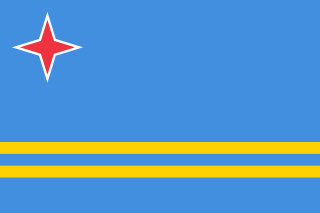
Aruba, officially the Country of Aruba, is a constituent country within the Kingdom of the Netherlands, in the southern Caribbean Sea 29 kilometres (18 mi) north of the Venezuelan peninsula of Paraguaná and 80 kilometres (50 mi) northwest of Curaçao. In 1986, it became a constituent country within the Kingdom of the Netherlands and acquired the formal name the Country of Aruba.
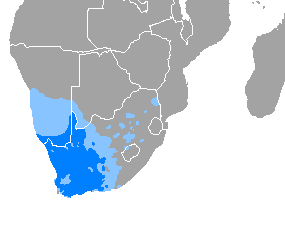
Afrikaans is a West Germanic language, spoken in South Africa, Namibia and Botswana, Zambia and Zimbabwe. It evolved from the Dutch vernacular of South Holland spoken by the predominantly Dutch settlers and enslaved population of the Dutch Cape Colony, where it gradually began to develop distinguishing characteristics in the 17th and 18th centuries.

Belgium, officially the Kingdom of Belgium, is a country in Northwestern Europe. The country is bordered by the Netherlands to the north, Germany to the east, Luxembourg to the southeast, France to the south, and the North Sea to the west. It covers an area of 30,689 km2 (11,849 sq mi) and has a population of more than 11.7 million, making it the 22nd most densely populated country in the world and the 6th most densely populated country in Europe, with a density of 383/km2 (990/sq mi). Belgium is part of an area known as the Low Countries, historically a somewhat larger region than the Benelux group of states, as it also included parts of northern France. The capital and largest metropolitan region is Brussels; other major cities are Antwerp, Ghent, Charleroi, Liège, Bruges, Namur, and Leuven.

Borneo is the third-largest island in the world, with an area of 748,168 km2 (288,869 sq mi). Situated at the geographic centre of Maritime Southeast Asia, it is one of the Greater Sunda Islands, located north of Java, west of Sulawesi, and east of Sumatra.

The Glorious Revolution was the deposition of James II and VII in November 1688. He was replaced by his daughter Mary II, and her Dutch husband, William III of Orange, who was also James's nephew. The two ruled as joint monarchs of England, Scotland, and Ireland until Mary's death in 1694, when William became ruler in his own right. Jacobitism as a political movement persisted into the late 18th century. William's invasion was the last successful invasion of England.

The Netherlands, informally Holland, is a country in Northwestern Europe, with overseas territories in the Caribbean. It is the largest of the four constituent countries of the Kingdom of the Netherlands. The Netherlands consists of twelve provinces; it borders Germany to the east and Belgium to the south, with a North Sea coastline to the north and west. It shares maritime borders with the United Kingdom, Germany, and Belgium. The official language is Dutch, with West Frisian as a secondary official language in the province of Friesland. Dutch, English, and Papiamento are official in the Caribbean territories.
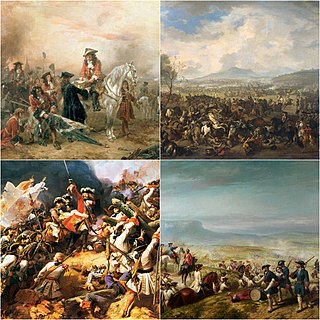
The War of the Spanish Succession was a European great power conflict fought between 1701 and 1714. The immediate cause was the death of the childless Charles II of Spain in November 1700, which led to a struggle for control of the Spanish Empire between supporters of the French Bourbons and the Habsburgs. Charles named his heir as Philip of Anjou, a grandson of Louis XIV of France, whose claim was backed by France and most of Spain. His rival, Archduke Charles of Austria, was supported by the Grand Alliance, whose primary members included Austria, the Dutch Republic, and Great Britain. Significant related conflicts include the 1700 to 1721 Great Northern War, and Queen Anne's War.

Christiaan Huygens, Lord of Zeelhem, was a Dutch mathematician, physicist, engineer, astronomer, and inventor who is regarded as a key figure in the Scientific Revolution. In physics, Huygens made seminal contributions to optics and mechanics, while as an astronomer he studied the rings of Saturn and discovered its largest moon, Titan. As an engineer and inventor, he improved the design of telescopes and invented the pendulum clock, the most accurate timekeeper for almost 300 years. A talented mathematician and physicist, his works contain the first idealization of a physical problem by a set of mathematical parameters, and the first mathematical and mechanistic explanation of an unobservable physical phenomenon.

William III, also known as William of Orange, was the sovereign Prince of Orange from birth, Stadtholder of Holland, Zeeland, Utrecht, Guelders, and Overijssel in the Dutch Republic from the 1670s, and King of England, Ireland, and Scotland from 1689 until his death in 1702. He ruled Great Britain and Ireland with his wife, Queen Mary II, and their joint reign is known as that of William and Mary.
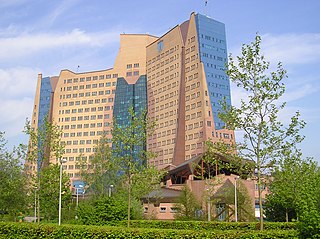
Groningen is the capital city and main municipality of Groningen province in the Netherlands. Dubbed the "capital of the north", Groningen is the largest place as well as the economic and cultural centre of the northern part of the country; as of December 2021, it had 235,287 inhabitants, making it the sixth largest city/municipality in the Netherlands and the second largest outside the Randstad.

The Christian Democratic Appeal is a Christian democratic and conservative political party in the Netherlands.

Michiel Adriaenszoon de Ruyter was a Dutch States Navy officer. His achievements with the Dutch navy during the Anglo-Dutch Wars earned him the reputation as one of the most skilled naval commanders in history.
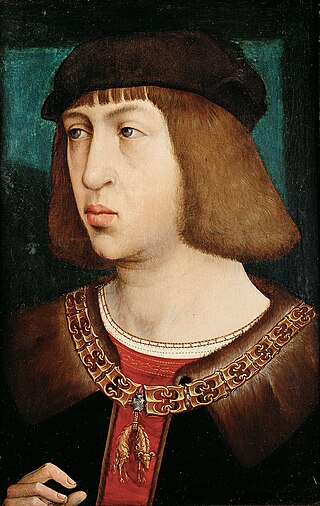
Philip the Handsome, also called the Fair, was ruler of the Burgundian Netherlands and titular Duke of Burgundy from 1482 to 1506, as well as the first Habsburg King of Castile for a brief time in 1506.

De Stijl, incorporating the ideas of Neoplasticism, was a Dutch art movement founded in 1917 in Leiden, consisting of artists and architects. The term De Stijl is also used to refer to a body of work from 1917 to 1931 created in the Netherlands. Proponents of De Stijl advocated pure abstraction and universality by a reduction to the essentials of form and colour. They simplified visual compositions to vertical and horizontal, using only black, white and primary colors.
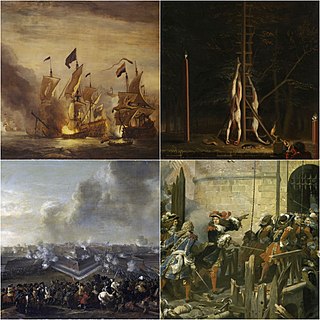
The Franco-Dutch War was a European conflict that lasted from 1672 to 1678. Its primary belligerents were France, backed at different times by Münster, Cologne, England, and the Swedish Empire, and the Dutch Republic, allied with the Holy Roman Empire, Spain, Brandenburg-Prussia and Denmark-Norway. The 1672 to 1674 Third Anglo-Dutch War and 1675 to 1679 Scanian War are considered related conflicts.

Malacca City is the capital city of the Malaysian state of Malacca, in Melaka Tengah District. It is the oldest Malaysian city on the Straits of Malacca, having become a successful entrepôt in the era of the Malacca Sultanate. The present-day city was founded by Parameswara, a Sumatran prince who escaped to the Malay Peninsula when Srivijaya fell to the Majapahit. Following the establishment of the Malacca Sultanate, the city drew the attention of traders from the Middle East, South Asia, and East Asia, as well as the Portuguese, who intended to dominate the trade route in Asia. After Malacca was conquered by Portugal, the city became an area of conflict when the sultanates of Aceh and Johor attempted to take control from the Portuguese.
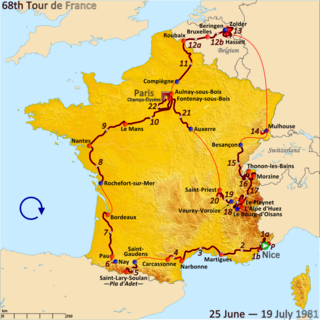
The 1981 Tour de France was the 68th edition of the Tour de France, taking place between 25 June and 19 July. The total race distance was 24 stages over 3,753 km (2,332 mi). It was dominated by Bernard Hinault, who led the race from the sixth stage on, increasing his lead almost every stage. Only Phil Anderson was able to stay close to him, until the 16th stage when he fell behind by about 7:00, and then on the 17th stage he would lose another 17 minutes. In the end only Lucien Van Impe, Robert Alban and Joop Zoetemelk were able to finish inside 20:00 of the now three time champ.
Jonathan Irvine Israel is a British historian specialising in Dutch history, the Age of Enlightenment, Spinoza's Philosophy and European Jews. Israel was appointed as Andrew W. Mellon Professor in the School of Historical Studies at the Institute for Advanced Study, Princeton, New Jersey, in January 2001 and retired in July 2016. He was previously Professor of Dutch History and Institutions at the University College London.
Afrikaners are a Southern African ethnic group descended from predominantly Dutch settlers first arriving at the Cape of Good Hope in 1652. Until 1994, they dominated South Africa's politics as well as the country's commercial agricultural sector.

Robert Frank Willem "Wim" Kortenoeven is a Dutch author, journalist and former politician.


















